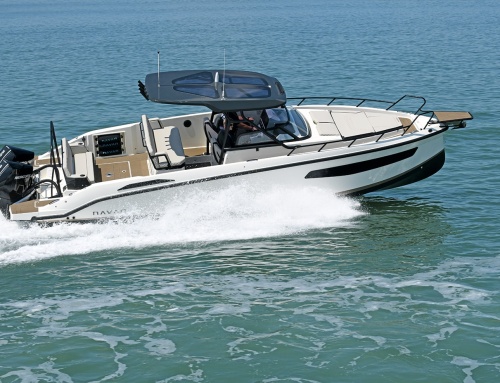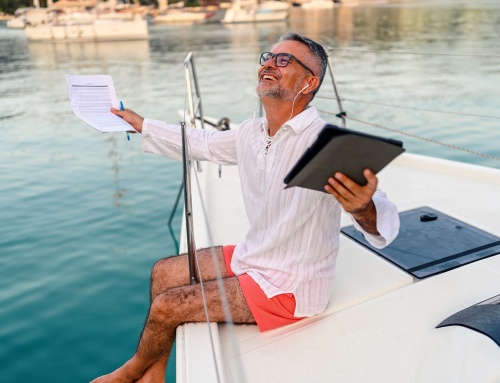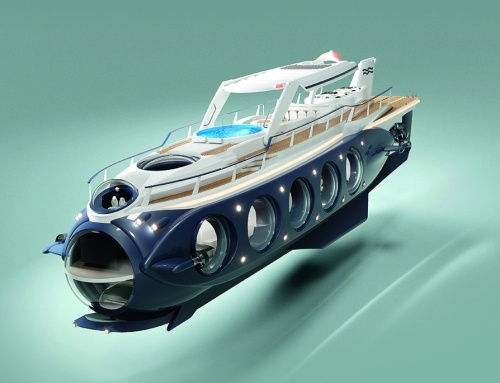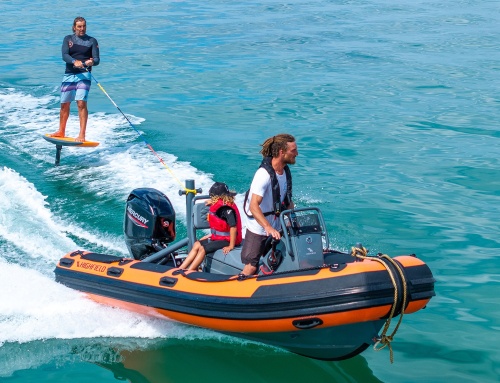‘Variety is the spice of life’, so the saying goes. So have you ever pondered the prospect of heading by road with your boat to the South of France?
What might be involved in boat trailering abroad, how much might it cost and what destinations could await? Jeremy Webb considers the options with a view to making that prospect a little more achievable …
The UK without doubt has much to offer boat owners – indeed, all those with a love of the sea. Our varied and ever-changing coastline is like no other, and this, of course, is reflected in its rich beauty, precious habitats and history too. Harbours and havens of every sort abound, each with their own distinctive character, each offering a different reward. But as special as our native coastline is, sometimes it’s nice to experience the pleasures associated with other cultures – to try out new waters and experience the delights of boating in a climate perhaps a little less prone to cloud!
With such in mind, have you ever considered boat trailering abroad but dismissed the idea as being too onerous or difficult to undertake? Depending on the boat you own, of course, you could be right! But then again, many have trailed to the Continent and found it to be a wonderful addition to their UK boating activities, as well as giving them an adventure to remember. For others, hiring or chartering a boat at their chosen destination makes even more sense. Either way, taking the step to cross the Channel in order to explore a foreign coastline, or even Europe’s lakes, shouldn’t be dismissed.

Port of Nice, Cote d’Azur, France.
Plans & options
In this article, and for the purpose of our exercise, we have chosen three destinations on the south coast of France. But, in principle a least, you could apply the key aspects/factors we highlight here in order to plan a route to any Continental destination, including France, Spain, Italy or Portugal. Of course, if time is not an issue, then in theory, any destination of interest has the potential to be worthy of exploring.
In terms of ‘practicalities’, a motorhome would likely make a very sound option – one that would allow you to trail a small RIB of perhaps 4–5m in length. If you are the owner of such a vehicle, then providing your motorhome with the ability to tow will likely present few problems. Alternatively, if hiring is your preference, you will need to locate a motorhome hire company that supplies vehicles that can tow, and in all instances, you will need to communicate with your insurers accordingly. But then, with a couple of bikes racked or stowed, you’ll have a three-way combination that will give you ultimate flexibility and a means of exploring any coast or inland waterway of your choice when trailering abroad.

Of course, if the prospect of towing a boat abroad is not something you wish to entertain at all, you could consider instead the option of an electric outboard-powered inflatable boat. In this respect, the combination of a good-quality, modern 3–3.5m inflatable that can be quickly and effortlessly auto-inflated, coupled to, say, a lightweight but powerful Avator or Torqeedo electric outboard, would represent a really practical package to enable two or maybe even three people to get waterborne and go exploring from any waterside destination of their choice. Unlike a craft that needs to be towed, this set-up also has the benefit of being safely stowed within the large locker of the motorhome and is therefore less likely to be subject to theft or damage.

Logistics & costs
Let’s move on now to the matter of costs and related logistics – firstly, the Folkestone/Dover to Calais travel option of a return fare using either Eurotunnel or P&O Ferries. Toll fees and projected fuel costs are inclusive and based on a Land Rover Discovery Sport towing an 8m-plus trailer. We’ve also included the cost for just the vehicle alone, for those of you who may wish to simply drive to the destination and then hire or charter.

Screen grab from the Emovis tag website.
Transport costs to trailer boat to France
Firstly, prices based on the summer month of June:
- Eurotunnel return with trailer: £617
- Vehicle only: £282
- Ferry return with trailer: £539
- Vehicle only: £220
Secondly, by way of comparison, the prices in July:
- Eurotunnel return with trailer: £840
- Vehicle only: £347
- Ferry return with trailer: £648
- Vehicle only: £294
We found a beneficial tool that you might also like to check out: the SANEF website cost calculator. The calculator does all the work for you. Just select the desired route, add in the vehicle size and whether towing or not and it will do the calculations. It allows you to plan for fuel costs as well as toll charges when boat towing abroad.
Here’s the link: https://www.autoroutes.sanef.com/en/my-journey/price-of-my-journey
Tapping the relevant information into the SANEF website cost calculator for the essential charges relating to the towing of a 7m RIB and trailer resulted in these cost projections:
- Péage/tolls: €124.10
- Diesel: €142.20
- Total one way: €266.30
And not towing, so just the vehicle alone (expenses reflecting better fuel economy and reduced toll fees):
- Péage/tolls: €78.70
- Diesel: €110.63
- Total one way: €189.33
We’d also recommend purchasing a Emovis Tag for travelling through France. This is an electronic device you place on the inside of your windscreen (on the passenger side). This allows you to use the Liber-t lanes at French tolls, thus saving queue times, especially during peak holidays, which tend to be August in France. You can open an account on the UK website (www.emovis-tag.co.uk/french-toll-tag), then set up a direct debit for the annual admin fees and tolls you incur, and lastly purchase the device.

P&O Ferries, Dover. This option costs around £648 iStock © stockcam
Points to remember
Do not take spare fuel containers when travelling either through the Channel Tunnel or on a ferry as they represent a fire hazard. All charging of such tanks should be done at your destination.
Be sure to take all documentation necessary when travelling abroad for your vehicle, your trailer and your boat, i.e. travel, vehicle, trailer and boat insurance docs, ID/passports, proof-of-purchase documents, hire documents and any other paperwork you think might be needed by, or useful to, the authorities.
Boating in European waters requires you to hold an ICC (International Certificate of Competence) and, in addition, at the very least, an RYA Level 2 Powerboat certificate. The latter is also a legal requirement for those helming craft of up to 10m in length in most countries outside the UK.
Be sure to check that all your paperwork and necessary licences are valid and in date.
Having all your paperwork in order will save questions being asked by the customs authorities on both sides of the Channel. Upon our checking with Gov.UK regarding taking a boat out of the UK, the general advice was that if the equipment is for personal use, you will be cleared for travel. But if your journey has any commercial interest or implications, then a different set of requirements applies. Be sure of your intent and check the customs’ requirements accordingly.

Port de Fréjus, overlooking marina. © BearFotos
Accommodation
You can take several routes, of course, from Calais to the Mediterranean, but we have chosen just two examples to keep things easy. The destinations we’ve chosen are Fréjus, Nice and Cannes. One suggested route would be from Calais to Dijon, then on towards Lyon and thereafter to Provence. If you decide to go via Paris, then perhaps consider overnighting in Orléans – one of the oldest cities in France located about 120 kilometres south-west of Paris. This heritage-rich and colourful city is the prefecture of the department of Loiret and of the region of Centre-Val de Loire.
Due to the distances and the slower speeds involved, especially if towing a trailer, you’ll likely wish to make at least one stop to break the journey on your way down to the Mediterranean – and likewise on the return journey too. The following prices are therefore based on a typical family room at a ‘medium-priced’ hotel at the following locations:
Dijon: June, £59 per night; July, £78 per night.
Orléans: June, £75 per night; July, £75 per night.
Of course, you should factor in similar costs for your return journey.

Fancy breaking the journey with a stop at Dijon. © Leonid Andronov
Destination choices
Port de Fréjus
Now we’ve covered the basic travel expense side of things, let’s say a few words firstly about Port de Fréjus. This delightful destination offers a full range of services tailored to the leisure boater’s needs. There are many restaurants and recreational areas near the port, as well as beaches to discover and the Base Nature leisure park, which is well worth a visit. Indeed, Port de Fréjus makes for a pretty good place to aim for culturally and for that all-important Frenchified boating hit.
Fuelling services in Port de Fréjus operate from 8am to 7pm during the main summer season. But beware, as is common on ‘Le Continent’, it’s all self-service using a payment/credit card (NB: Take more than just one credit card, and remember – not all French machines accept foreign cards!).

The beautiful Port de Fréjus. © Musat
As for fuel prices, at the time of writing, these were €1.60 per litre for petrol and €1.80 for diesel. For electric hook-up, it’s best to contact the Capitainarie (harbour master’s office) on arrival to discuss your requirements and you’ll be shown a suitable marina berth equipped with this facility. The marina power equates to 220V/16A for vessels up to 15m LOA and 380V/63A for craft over this waterline length (power can be adjusted to meet specific requirements upon request).
There is free Wi-Fi access on every pontoon at Port de Fréjus, but please enquire at the harbour master’s office. Four toilet units are reserved for boaters in the port and are open 24 hours. Fresh water is available too on each pontoon, and two coin-operated laundries are also provided in the port facility.
A concierge service offers everything you may require while using Port de Fréjus, making your French stay even more hospitable – and as part of this, an air-conditioned and fully equipped relaxation area, reserved exclusively for pleasure boaters, can be found just above the harbour master’s office. Its terrace, meanwhile, affords unobstructed views over the port, the Mediterranean, the mountains and the Fréjus bell tower. The port is near many shops, with high-quality provisioning provided courtesy of a supermarket, a delicatessen, a wine merchant and a boulangerie, with each offering delivery or takeaway.
Keeping your vessel in the marina costs €80 a day, and although not cheap, this does allow you to use all services.
Port de Fréjus also has a slipway, located right by the entry to the port from the sea and close to a car park for your vehicle and trailer, at a cost of €15 a day.
For all further information, see https://www.portfrejus.fr/en/.
Le Port de Nice
Famous for its sunny climes, gorgeous beaches and colourful architecture, the newly UNESCO-listed French city of Nice is packed with art, culture and world-class things to see and do. It’s famous for its classic beauty, and of course, Nice typifies everything one tends to associate with this special region of southern France. Le Port de Nice itself is ideally situated close to the centre of the town. This is great because it means all the town’s attractions, including its restaurants and fashion shops, are really close at hand. The port’s Capitainarie here is ready to assist with mooring or departing and can help with launching from the free-of-charge slipway too. The staff are also knowledgeable about the area and are on hand to make life easier for you, including connecting you up to the marina power network if required and the must-have Wi-Fi, which is also free.

Port of Nice. © Shutterstock/Christian Musat
The basic services at the marina include assistance with mooring/casting off, electric bike loans, and a library and concierge service. You can leave your luggage with the concierge, who will lock it away securely.
A station for your refuelling requirements can be found on a 15m triangle spit close to the entrance of the port. Here you can purchase duty-free petrol and diesel. Card payment is available, but once again, do take a couple of different cards in case the machine doesn’t accept those tricksy British ones!
Don’t forget to make your presence known to the port office as soon as possible. As with any foreign port, on your arrival, you’ll need to show all your paperwork, passports, etc. and fill out any customs forms required. You’ll also likely be asked to pay any fees at this point, whereupon you can collect your ID badges.

Port of Nice. ©LiliGraphie
The laundry and dryer are available from 8am to 6 pm, and tokens for these are collected from the port office. You can use luggage trolleys for free, and a slipway can be employed 24 hours a day. There’s 24-hour access to the showers and lavatories, which you’ll find located around the port’s perimeter.
Mooring rates for a boat under 10m at the time of writing were €97 per day. Also, Nice has several small slipways that can be found on the beaches along the coast. But take care to park your vehicle and trailer in the allocated car parks – or you’ll get yourself into trouble!
For all further information and local knowledge, see https://leportdenice.com/.
Les Ports de Cannes
The charming and elegant town of Cannes wraps itself around a half-moon body of water, crowned by a historic quarter. The latter looks down upon the harbour with a dignity and authority only matched by its years. Cobbled streets climb the hill here, while down below, the famed waterfront bears away eastward to give itself over to a majestic panorama of grandiose period hotels and splendid pavement-fronted restaurants. From a boating perspective, Cannes benefits from having several marinas at its disposal, including IGY Vieux Port de Cannes. This marina is located close to the town’s central area with its wonderful variety of seafood cafés, food markets, general stores and easily accessed safe bathing beaches.

Vieux Port, Cannes © iStock/Gordon Bell Photography
Services available in the IGY Vieux Port marina include electric bike rental, an on-site boatyard for all manner of repairs and servicing, a full-service concierge and even diving services. Free Wi-Fi is available on all pontoons and there is 24/7 security throughout. The mooring rate for sub-10m vessels is €105 per day.
The fuelling area is close to the marina breakwater and the Capitainarie. At the time of writing, petrol cost €1.65 a litre and diesel €1.87. It’s best to contact the marina office when you need to recharge your tanks: they tend to appreciate being given a little notice, especially during busy periods. As for pontoon electric hook-up, this is rated at 400A. If, though, you’re seeking e-boat fast-charger units, then not only Cannes but also Saint-Tropez to the west and Monaco and Ventimiglia to the east all benefit from Aqua superPower fast-charger docks. If you do require e-boat fast charging, then inform the marina staff at the point of your arrival and you’ll be duly assisted.
According to the Mayor’s office, there are several free-to-use public slipways located along the coast road connecting the beaches in the Bay of Cannes. Access must be maintained, so don’t leave a trailer or vehicle blocking a slipway or its approach.
For all further information, see the helpful website https://www.igymarinas.com/marinas/igy-vieux-port-de-cannes/.
Charter & boat hire in France
If you have driven down to the south coast of France and wish to bareboat charter or hire a boat upon reaching your destination, the following may be of help to you. But beware – an eight-hour/single day’s hire isn’t cheap!
Nice:
Typically, €500 for a one-day hire of a 7m RIB (fees include insurance and mooring).
A Capelli Tempest 700 moored in Port du Nice.
https://www.rent-my-boat-nice.fr
Cannes:
Typically, €500 for a one-day hire of a 7m RIB (fees include insurance and mooring).
Boats are located in Port du Moure Rouge.
https://www.cannesboatlocation.fr/
Fréjus:
Typically, €400 for a one-day hire of a 7m RIB (fees include insurance and mooring).
Boats are located at Port Fréjus.
A website such as Click&Boat is a very helpful aid when planning and budgeting for hire and charter and helps to eliminate ambiguity when arriving at your destination. The benefit of day hire, of course, is that you can have a break from being out on the water and do other activities without paying for a day or more that you don’t need. It does pay to hunt around, though. I found a Marshall M6 RIB, a 2022 model, in Fréjus for £289 per day, with the owner advertising the fact that he allows the use of wakeboards and donuts too. It seems that some owners will also help negotiate berthing fees for you, depending on which marinas you choose. Companies and individuals involved in such enterprises can often provide great support in helping you benefit from their local knowledge. Their guidance on the area and the peculiarities of the coastline and local waters can be invaluable.
A point worth highlighting here is Click&Boat’s recommendation that you take out additional insurance above what the owners provide in the rental contract. See https://www.clickandboat.com/en/ for additional information on this and other matters.
In compiling this article, we found contacting each location’s Mayor’s office and the Tourist Information Office helpful. They will provide you with maps of the area in advance as well as information about any events happening while you are in the area, hospitals, police stations and much more, including any free launching sites.

Make a check list
Finally, one more tip: Make a checklist for everything in advance so you don’t overlook any aspect of your trip or the arrangements relating to your destination. Keep all documentation in a file close to hand so it’s easy to grab for border personnel to check if they ask for any paperwork. Take out appropriate travel insurance and be conscious of your own security and that of your possessions. It may seem obvious, but bearing in mind that the total road journey is about 750 miles from Calais to Cannes (and likewise the other destinations given), be sure to have your vehicle serviced prior to setting off, and your road trailer too, and take the time to familiarise yourself with Continental driving/towing regulations.

Keep all your documents in one file easily to hand
We hope this summary has been helpful, if not a little thought-provoking. There’s lots to consider here, but then they do say that ‘variety is the spice of life’!










